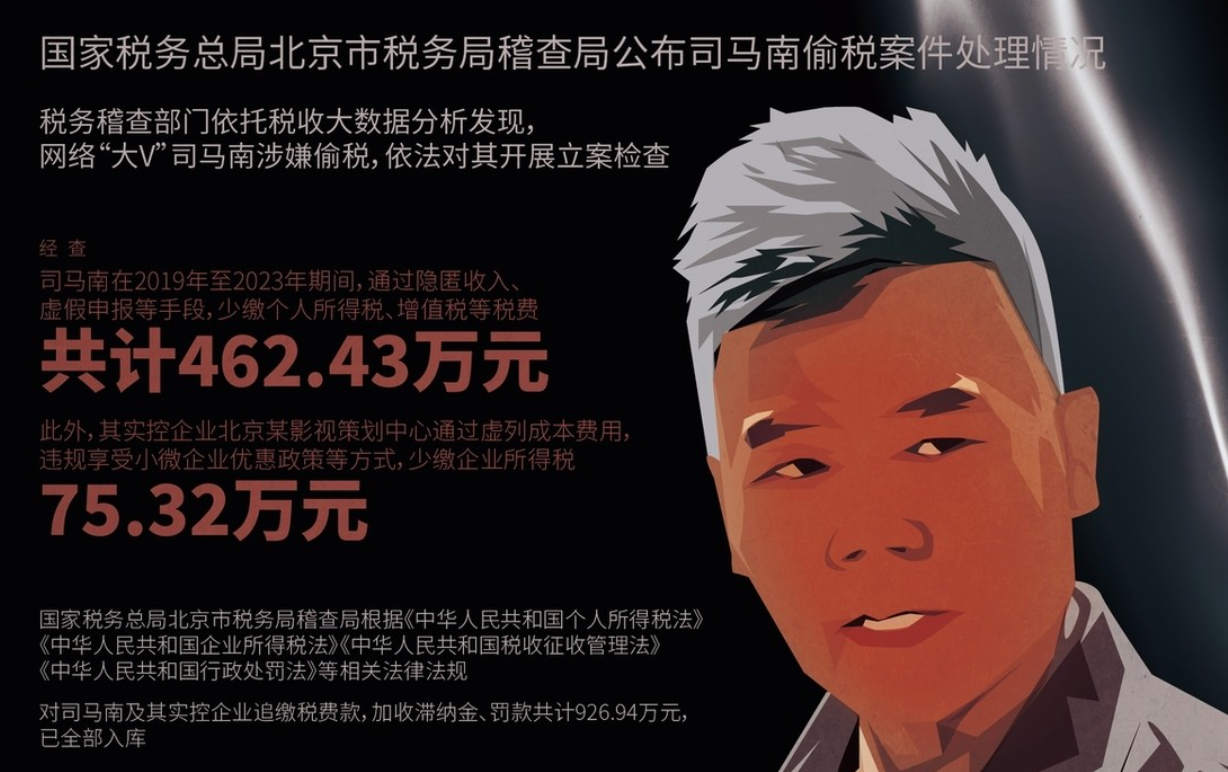The End of Online Patriotic Performance: Sima Nan’s Tax Evasion Case Unveiled
Beijing, March 21, 2025 – The Beijing Tax Bureau of the State Administration of Taxation has released its findings on the tax evasion case of online influencer Sima Nan, sparking widespread public attention. According to the investigation, between 2019 and 2023, Sima Nan evaded 4.62 million yuan in personal income tax and value-added tax by concealing live-streaming rewards and splitting advertising contracts.
Based on the Tax Collection and Administration Law, tax authorities have recovered a total of 9.27 million yuan in unpaid taxes, late fees, and fines, which was fully paid on March 18. The case is particularly striking given Sima Nan’s history of publicly condemning tax evasion, creating a sharp contrast between his persona as an "anti-capitalist fighter" and his own violations. This contradiction led to the complete suspension of his social media updates , despite having over 50 million followers.
The case highlights significant advances in tax monitoring technology. Authorities used the Tax Big Data Monitoring System to identify Sima Nan’s evasive tactics, including income diversion across multiple accounts, dual contract schemes, and shell company cancellations. The newly introduced "penetrative supervision" clause in the 2024 Tax Law Amendment Draft requires platforms to share streamer income data, making it harder for influencers to conceal earnings.
Statistics show that in 2024 alone, China’s tax monitoring system recovered 1.13 billion yuan from live-streamers, marking a transition from manual audits to intelligent tax enforcement.
Public Reactions and Social Divide
The case has led to a divided public response. About 78% of online users support cracking down on "performative patriotism," asserting that "true patriotism means paying taxes honestly." Many are particularly outraged by Sima Nan’s past criticisms of Western values while reportedly purchasing property in the United States. However, some loyal supporters claim he was a victim of accounting errors or a conspiracy against nationalist voices, even suggesting political motives behind the investigation.
This divide reflects a deeper tension within the online ecosystem—between the enormous financial incentives of the influencer economy and the public's expectation for moral integrity among opinion leaders. Sima Nan’s commercial value, with single-advertisement rates exceeding one million yuan, starkly contradicts his "voice of the people" image.
The case also raises policy challenges. While patriotic narratives have been leveraged for online traffic, existing regulations lack clear boundaries on "performative patriotism." At the same time, platform algorithms amplify emotionally charged content, creating an unbalanced digital environment. For instance, on platforms like Bilibili, historical short videos generate three times more engagement than entertainment content but struggle to be monetized, leading to a "high-traffic, low-revenue" dilemma.
In response, authorities have begun drafting systemic governance solutions:
- At the end of 2024, the State Administration of Taxation released a draft Regulations on Tax Information Reporting for Internet Platforms, requiring platforms to report influencer earnings quarterly and mandating audits for accounts with over a million followers.
- The AI-Generated Content Identification Guidelines were introduced to establish ethical boundaries for AI-generated content.
These measures align with President Xi Jinping’s statement that "patriotism is the genetic spirit of the Chinese nation." Historical lessons, such as the Shanghai Bund Stampede and Chengdu Chunxi Road Gatherings, underscore the importance of combining strict legal enforcement (e.g., severe penalties for data breaches under the Cybersecurity Law) with flexible guidance to prevent patriotism from becoming a mere commercial performance.
A New Direction for Online Values
The Sima Nan case marks a turning point in reshaping online values. Surveys show that while 78% of netizens call for an end to "hypocritical performances," 62% still hope for "positive narratives that unite public consensus." This contradiction reflects the realities of a society in transition.
The Patriotic Education Law has already begun integrating online and offline patriotic messaging with success. For example, the Communist Youth League’s short video "Premier, Can You Hear Us?" resonated strongly through historical comparisons, garnering over 100 million views. Meanwhile, News Broadcast’s Douyin account, which adopts a more youth-friendly tone, has attracted thirty million young followers, proving that mainstream discourse can effectively engage with digital audiences.
The downfall of figures like Sima Nan should serve as an "adulthood test" for China’s internet culture. Breaking free from the distorted logic of "patriotism is above accountability" and "traffic reigns supreme" will allow the "silent majority" of honest taxpayers to replace the "performance artists" who exploit public sentiment. Only then can the online space nurture genuine and uplifting values that are deeply rooted in reality and growth-oriented.
The ultimate goal of this journey is not the social downfall of a single influencer, but rather the spiritual renewal of a nation in the digital age. Through sound regulations and value-driven guidance, China can ensure a healthier digital landscape where patriotism returns to its true meaning and significance.

评论